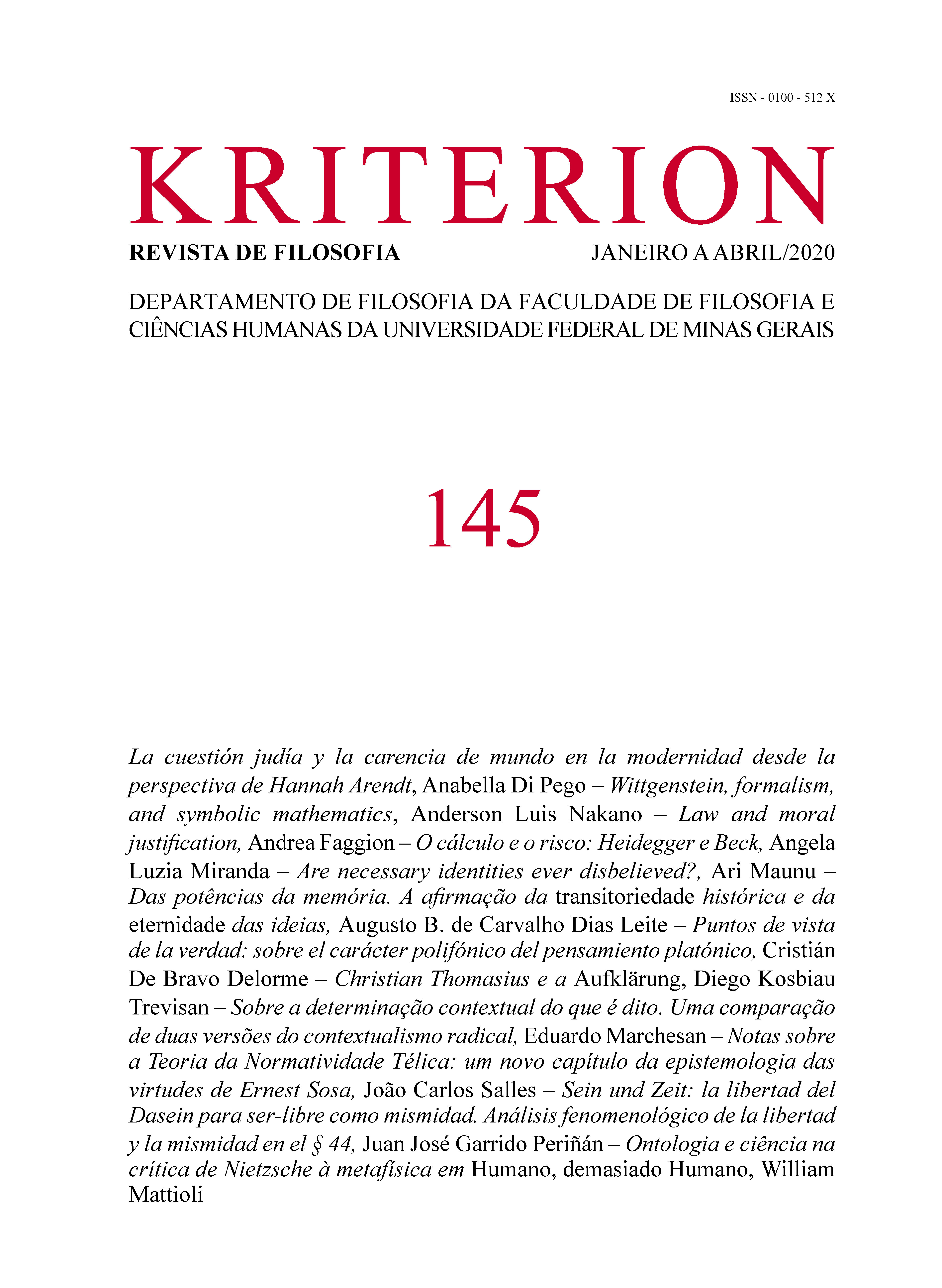SOBRE A DETERMINAÇÃO CONTEXTUAL DO QUE É DITO: Uma comparação de duas versões do contextualismo radical
Keywords:
o que é dito, onteúdo proposicional, intenção, contextualismo radicalAbstract
François Recanati and Charles Travis have questioned the traditional distinction between semantics and pragmatics by criticizing Grice’s notion of what is said. They are both opposed to the idea that what is said can be read in terms of the conventional meaning of the uttered sentence. Both authors share the thesis according to which what is said does not necessarily put forward a propositional content equivalent to the literal meaning of the uttered sentence. My objective in this paper is to point out important differences between these two positions that are sometimes referred to indistinctively as Radical Contextualism. The paper is centered on the analysis of Recanati’s amendment of the notion of what is said. I first show how his reconstruction of this notion is motivated by the preservation of Grice’s attempt to explain communication in terms of the intention of the speaker. I then proceed to point out how his contextualism admits the idea of a minimal propositional content attached to the meaning of subsentential components. I conclude by arguing that Travis’ rejection of Grice’s whole framework goes against Recanati’s attempt to amend Grice’s notion of what is said.
Downloads
References
BORG, E. “Pursuing meaning”. Oxford: Oxford University Press, 2012.
CAPPELEN, H., LEPORE, E. “Insensitive semantics”. Oxford: Blackwell, 2005.
CHAPMAN, S. “Paul Grice, Philosopher and Linguist”. New York: Palgrave Macmillan, 2005.
GRICE, P. “Studies in the way of words”. Cambridge: Harvard University Press, 1989.
KAPLAN, D. “Demonstratives.” In: ALMOG, J. WETTSTEIN, H., PERRY, J. Themes from Kaplan. Oxford: Oxford University Press, pp.481-563, 1989.
MORAN, R. “The exchange of words”. Oxford: Oxford University Press, 2018.
NEALE, S. “Paul Grice and the Philosophy of Language”. Linguistics and Philosophy, 15, pp. 509-559, 1992.
RECANATI, F. “The pragmatics of what is said”. Mind & language, Vol. 4, Nr. 4, pp. 295-329, 1989.
_____. “Direct reference: from language to thought”. Oxford: Blackwell, 1993.
_____. “Literal/non-literal”. Midwest Studies in Philosophy, Oxford, Vol. 25, Nr. 1, pp. 264-274, 2001.
_____. “Literal meaning”. Cambridge: Cambridge University Press, 2004.
_____. “Pragmatic enrichment”. 2010a [on line]. Disponível em https://jeannicod.ccsd.cnrs.fr/ijn_00503959/document (Acessado em 10 de maio de 2019).
_____. “Truth-conditional pragmatics”. New York: Oxford University Press, 2010b.
SPERBER, D., WILSON, D. “Relevance: Communication and Cognition”. Oxford: Blackwell, 1986.
STANLEY, J. “Language in context”. Oxford: Oxford University Press, 2007.
STEVENSON, C. L. “Ethics and language”. New Haven: Yale Univesity Press, 1944.
STRAWSON, P. F. “On referring”. Mind, Oxford, Vol. 59, Nr. 235, pp. 320-344, Jul. 1950.
TRAVIS, C. “Thought’s footing. Oxford: Oxford University Press, 2006.
_____. “On what is strictly speaking true”. In: TRAVIS, C. Occasion-sensitivity. New York: Oxford, 2008a, pp. 19-64.
_____. “Annals of analysis”. In: TRAVIS, C. Occasion-sensitivity. New York: Oxford, 2008b, pp. 65-93.
____. “Meaning’s role in truth”. In: TRAVIS, C. Occasion-sensitivity. New York: Oxford, 2008c, pp. 94-108.










